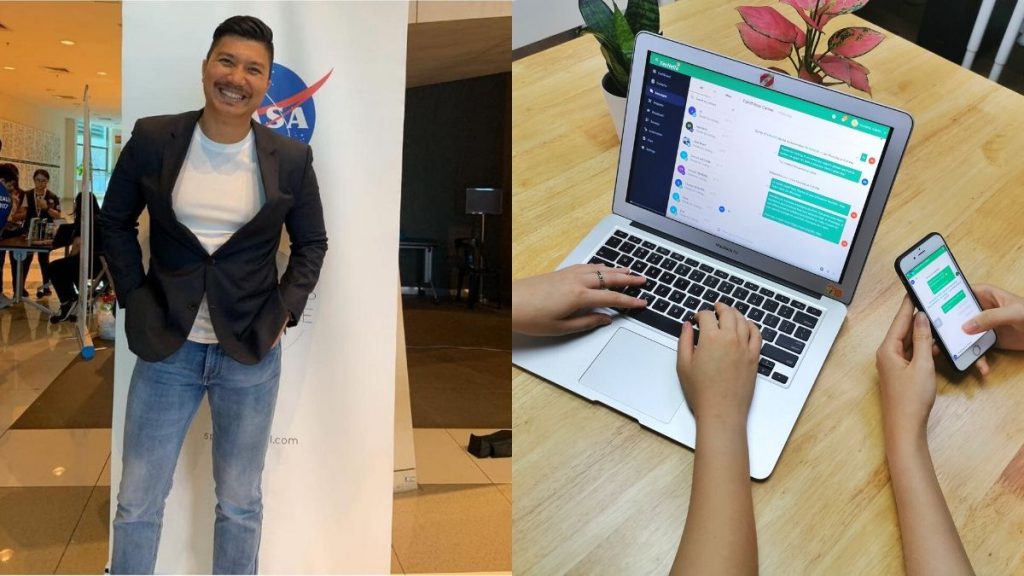Author’s Blurb: Reaching out to plenty of people to conduct interviews, it’s such a hassle when my colleagues need to know what’s happening in a conversation, especially since messaging apps don’t have a CC function like emails. Unfortunately, the only way to do this is if I hand over my phone.
Carliff realised that this is a pain point for many entrepreneurs, too. Especially those in retail and e-commerce when it comes to customer service and sales.
He said that most companies have one single business number on one phone, which has to be passed around to many employees when replying to customers.
Companies may also ask their employees to use personal phone numbers, which can be a problem when it comes to separating work and life.
“This is okay for a while, but long term, the staff won’t like this because they have to give support to clients 24/7, which they may not really want to as they can’t run away from work,” he said. “Plus, for the company, there’s data and privacy issues involved.”
With a background in developing ChatBot in 2017, he converted his expertise to come up with YesHello, a Software-as-a-Service (SaaS).
Team Inboxes For WhatsApp
YesHello is a team inbox for WhatsApp and other messaging platforms like Line, WeChat, Facebook Messenger, and SMS.
It’s basically a business messaging platform that allows teams to share one business phone number to reply to customers without having to share a single phone.
Team members are added onto the company’s YesHello account, where members will have access to all incoming and outgoing messages at the same time from their own separate login.
Think of it like editing the same Google Doc from separate Google accounts.
The software also comes with a chatbot feature that can reply instantly to customer enquiries.

But with multiple people having access to each chat, wouldn’t a team inbox be messy? For example, how would enquiries be delegated?
Carliff said that’s what the “assignment” feature is for. A boss can assign his employee (let’s call that employee Bob) to a contact and other members can see who each contact is assigned to.
Chats are also separated into 2 folders. They’re called “All” and “My Folder”.
If no one is assigned to a specific contact from the “All” folder, it works on a first-come, first-serve basis.
So once Bob chats with a contact, it will automatically be moved into “My Folder” on his account.
A notification will then pop up to tell Bob that this contact is in the middle of a conversation with a bot, and it will ask if he would like to take over.
“So then this contact is now assigned to him, and it will no longer be in the ‘All’ folder so there’ll be no confusion to the team,” Carliff added.
Doesn’t This Go Against WhatsApp Encryption?
According to WhatsApp’s Security, the encryption ensures that only you and the person you’re communicating with can read what is sent, and nobody in between, not even WhatsApp.
We didn’t understand how YesHello was working around this encryption, especially with so many users tied to a single WhatsApp number.
To which Carliff responded, “It isn’t in violation of WhatApp’s terms of service or privacy notice, as WhatsApp users still have end-to-end encryption.”
“The encryption happens from their device to the service provider that they’re with, ensuring that the conversation is private and secured. When a conversation is between a WhatsApp User and a WhatsApp Business API account, the encryption takes place between these two ‘users’.”
Essentially, because there are only 2 numbers involved—the customer and the business number—YesHello isn’t technically going against any encryption policies.
Gaining Customers To Help Customers
Since launching in April 2020 during the MCO, the company currently has 100 active users and has attained more than RM50,000 in revenue.
Some of their notable clients include Volvo in Bukit Bintang, the Ministry of International Trade and Industry of Malaysia (MITI), and Landrover in Penang, to name a few.
Though their main mission from starting this software was to help SMEs, YesHello’s subscription plans are able to cater to companies of all sizes.
Their pricing structure is as follows:
- For the Starter Plan of RM79/month, access is given to 2 team members to service 200 clients,
- Their Pro Plan costs RM299/month for 5 team members and 1,000 customers,
- A Business Plan is RM799/month for unlimited team members and 5,000 customers.
To us, all the monthly plans seemed rather pricey for a messaging software.
But Carliff justified that they were worth it, especially the Business Plan for huge MNCs with a worldwide customer base.
“If you’re getting 1,000 enquiries from around the world about your sales campaign, you can have 20 members attending to them from anywhere in the world,” he said.
“If you’re making 5 to 6-figures in sales from them, what’s RM799 if you’re making 5 to 6-figures?”
He also explained that the number of customers on the platform are accumulated throughout the month and can be deleted to keep below the plan’s quota.
The team was able to back this up with case study results from one of their biggest clients, Peche, which is in the e-commerce scene creating beauty products with resellers in Africa, Brunei, Malaysia and Singapore.
By cutting down the average time it took for Peche’s sales reps to respond to leads by 89%, which meant from 90 minutes to 10 minutes, YesHello helped double Peche’s revenue growth from RM200,000 to RM400,000 in less than 2 months.

In the future, the team plans to launch an omni-channel messaging automation platform where all communication apps including Messenger, WeChat, and Line can be integrated into one single platform.
“This allows you to engage and interact with your customers in one place, regardless of how or when they connect with you,” said Carliff.
Bottom Line: I believe this system would benefit huge MNCs dealing with millions of clients from around the world the most, as this would enable them to keep all involved department members up to date with the status of a sale rather easily.
Featured Image Credit: YesHello












